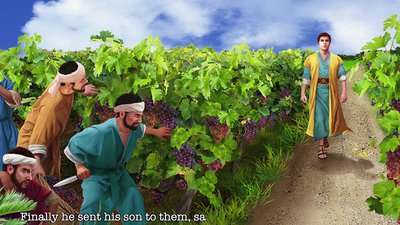Thoughts for the Day
Monday, 3rd June 2024: A parable about God's people
Mark 12 Parable Chosen people Jesus God's Son
Reading : Verses from Mark, Chapter 12

Then Jesus began to speak to them in parables. ‘A man planted a vineyard, put a fence around it, dug a pit for the wine press, and built a watch-tower; then he leased it to tenants and went to another country. When the season came, he sent a slave to the tenants to collect from them his share of the produce of the vineyard. But they seized him, and beat him, and sent him away empty-handed. And again he sent another slave to them; this one they beat over the head and insulted. Then he sent another, and that one they killed. And so it was with many others; some they beat, and others they killed. He had still one other, a beloved son. Finally he sent him to them, saying, “They will respect my son.” But those tenants said to one another, “This is the heir; come, let us kill him, and the inheritance will be ours.” So they seized him, killed him, and threw him out of the vineyard. What then will the owner of the vineyard do? He will come and destroy the tenants and give the vineyard to others....’
When they realized that he had told this parable against them, they wanted to arrest him, but they feared the crowd. So they left him and went away.
(Lectionary, New Revised Standard Version)
Thoughts
Jesus is in Jerusalem and the crowds have followed him. He tells them a parable, and we can almost imagine it visually as a cartoon strip it's so vivid. The people know well that when a teacher talks of a vineyard and its owner he is talking of God's chosen people and their relationship with Him. After all Isaiah and Jeremiah had used such images, slating the people for producing 'wild grapes' (5.2 and 2.21), that is to say not producing what was owed to God as His faithful people. This is the story of God and His people, and it's the story of Jesus.
God has established his chosen people giving them everything they need (see creation of the vineyard) and he has patiently waited for them to turn to Him (the time it takes to grow vines and produce wine). He sends His prophets (the slaves) to call the people to Him in repentance, and they refuse, treating them badly. Finally, God sends His beloved Son (Jesus), and they respond by killing him.
Jesus tells this parable about himself and about an action that hasn't yet happened. In the parable there are consequences to the actions of the tenants, and the vineyard is given to others. When many of God's chosen people rejected the good news of the Gospel, it was quickly to spread around the Middle East to gentile communities. 2,000 years later as inheritors of the vineyard we should remember God's love and care for us and His incredible patience with us. May we also remember that the owner of the vineyard calls us to respond to Him.
Prayer
Lord Jesus Christ ,
we give You thanks for Your love and care
to all whom You met as You
walked the dusty roads
with Your disciples.
We thank You for love and care for us,
and for Your patience
with our failure to be the children
You would have us be.
Forgive us and help us to change.
Amen.
You might like to look at this video by Bible Project: